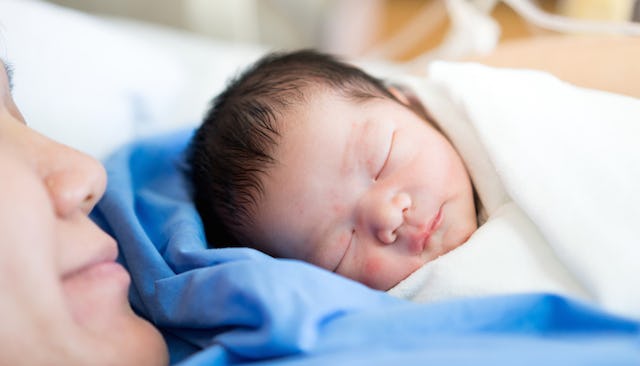Hundreds Of Hospitals Eliminate Nurseries In Supposedly ‘Baby-Friendly’ Trend

More ‘baby-friendly’ hospitals are doing away with nursery facilities
When it comes to the hours following labor and delivery, every mom is different. Some prefer to have the baby by their side at all times, and others prefer to make use of the hospital nursery so they can catch up on some much-needed rest while knowing their little one is safe. There’s no wrong way to recover from giving birth, but a popular “baby-friendly” initiative is taking the choice out of the matter. More and more hospitals are eliminating their nurseries in favor of allowing babies to “room in” with their moms at all times.
If you’ve given birth in the U.S. in the past few years, then you’re familiar with the concept of baby-friendly hospitals. In most cases, it means more emphasis on breastfeeding, skin to skin, waiting longer to cut the umbilical cord and, formerly, simply encouraging moms to keep the baby in their room with them as much as possible. But, as Today reports, over 355 hospitals have eliminated their nurseries completely, and by the end of next year, that number will climb to 530. To put that in perspective, that means about one in four births in the U.S. will take place at a hospital with no nursery facilities.
The hope is that forcing mom and baby to spend their entire hospital stay together will encourage on-demand breastfeeding and better bonding. Many Boston hospitals were among the earliest adopters of the no-nursery policy, and Lori Pugsley, the newborn family units nursing director at Massachusetts General Hospital, explained the change to Today by saying, “The research is abundant, and it shows the benefits of keeping a mom and baby together in a room really creates an environment that’s the healthiest for the baby and the healthiest for the mothers.”
It might be healthy for babies, but as a mom who’s given birth in one of these nursery-less hellscapes, I take issue with the idea that it’s in any way what’s best or healthiest for mothers. I gave birth to my second child two years ago, in a baby-friendly hospital with zero nursery facilities. After 22 hours in labor, I had to stand and give my son his first bath by myself in my hospital room sink while a nurse “supervised.”
My husband had to spend large chunks of time at home taking care of our other child, so I spent most of my “recovery” sleeping in two hour stretches and totally delirious with exhaustion. At one point, I was sitting in a chair in my room, breastfeeding my son at three in the morning, and he blew a diaper all over both of us. I called the nurse and asked her to please take him and bathe him, so I could change and get some uninterrupted rest. She couldn’t. They had no nursery, and it was “best” for us to stay together. I was in the best birthing hospital in the city and I was up shit creek without a paddle.
While it’s important for moms and babies to bond, forcing moms to do everything on their own immediately post-birth is simply ridiculous. Giving birth is an overwhelming, exhausting experience, and in many cases requires stitches or abdominal surgery. If a mom wants her baby in the room with her 24/7, that’s her prerogative, but it should always be a choice. Many of us choose hospital births because we want the extra help, support, and care. The last thing we need is to be told we can’t actually ask for help because it’s “better” for us to do it ourselves and suffer in silence.
As moms, we get guilt trips over everything from how we feed our kids to which diapers we use. This initiative just seems like yet another way to shame moms — for wanting rest, for being okay with spending a few hours away from their babies, for not working hard enough to “bond” with their newborns, for not breastfeeding on-demand. If we really want to be baby-friendly, we should start by supporting moms in whatever choices they feel are best for them. There’s nothing better for a mom than having the freedom and respect to make her own decisions, and there’s nothing better for a baby than a happy, healthy, well-rested, and confident mom.
This article was originally published on